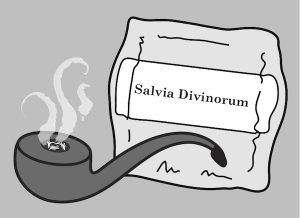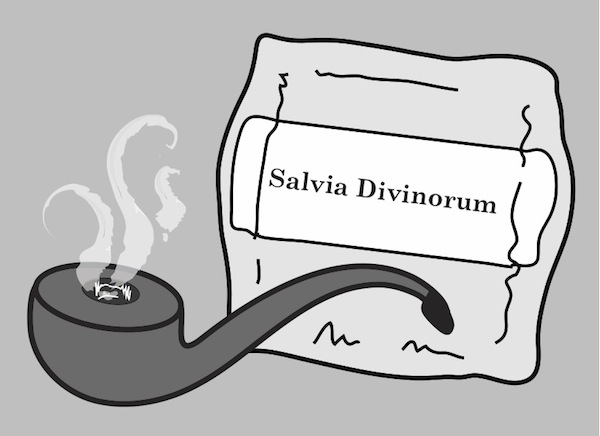By Jennifer Colbourne (Staff Writer) – Email
 According to CBC news, the Canadian government has confirmed that it is going to make an effort to criminalize the hallucinogenic drug salvia, though it could take up to two years for it to do so. Conservative MP Shelly Glover admitted that the anxiety about salvia use among Canadian teenagers has stemmed from recent high-profile usage by celebrity teens (notably Miley Cyrus), and noted that Health Canada is concerned because there has been little study on the drug’s long-term effects. Even more alarming to the government were the results of the 2009 Canadian Alcohol and Drug Use Monitoring Survey, which revealed that 1.6% of Canadians over 15 and 7.3% of those aged 15-24 have tried salvia.
According to CBC news, the Canadian government has confirmed that it is going to make an effort to criminalize the hallucinogenic drug salvia, though it could take up to two years for it to do so. Conservative MP Shelly Glover admitted that the anxiety about salvia use among Canadian teenagers has stemmed from recent high-profile usage by celebrity teens (notably Miley Cyrus), and noted that Health Canada is concerned because there has been little study on the drug’s long-term effects. Even more alarming to the government were the results of the 2009 Canadian Alcohol and Drug Use Monitoring Survey, which revealed that 1.6% of Canadians over 15 and 7.3% of those aged 15-24 have tried salvia.
Salvia.net, self-described as “a site dedicated to a plant variously named Salvia divinorum, Ska Pastora, Diviner’s Mint, Sally-D, and Lady Salvia,” is concerned about Canada’s move to ban the drug. The site states that “There are no reports of Salvia divinorum being either physically or psychologically addictive.”
It also claims that the drug “does not have any negative side-effects” and “is nearly impossible to overdose on… when used normally.” It states that while scientists have not determined what a lethal dose is, “they believe it is very high,” and argue that a user would lose consciousness before being able to overdose.
Therefore, according to Salvia.net, “The major health risk when using salvia is that a person might lose awareness and cause physical injury to himself or others. Therefore it is very important to have a sitter present at any time… Salvia should not be given to minors, mentally unstable, or violent people.”
Although often compared to LSD and other drugs, salvia is not related to any other commonly used drug, nor is it a “party drug,” as the effects are far too intense and short-lived. Salvia was originally ritually used by Mazatec shamans to enter the supernatural world; now, it has become “increasingly popular amongst explorers of non-ordinary states of consciousness,” according to Salvia.net. Activists claim that there have been no salvia-related fatalities to date, and that the drug is quite safe in a stable environment, but Health Canada and the government do not share in their confidence.
UFV students had mixed reactions to the proposed ban. One fourth year student, who preferred to remain anonymous, said: “I don’t think it really matters. Legal or not, people will do what they want. I guess that the government is trying to protect people from something that they feel is dangerous, but you can’t protect people from themselves.”
However, Nursing student April Zielinski begged to differ: “Seeing as it does have psychoactive effects, regulations should be put into place… It makes me nervous to think of what could happen to a hallucinating person in public. I think a lot more research should go into the effects of the drug and what it would be used for before making any kind of criminalization judgment against it… what benefits does it provide to a person’s health? Why is it legal? What is it supposedly for? If it’s only on the market so that kids can get a quick high, I’m all for taking it off the shelves.”
Fine Arts student Anne Franklin, on the other hand, argued that “most psychoactives, including salvia, ought to be legal to take. What we put in our bodies should be our own, properly educated decisions… I believe that when taken in the right setting, and with the proper intentions, people can and have achieved great insight through the use of non-addictive psychoactive substances. I personally doubt I would ever take salvia, but I’m strongly against denying anyone the opportunity if they feel it would lead them to a better place within themselves.”
First year student Vanessa Hoskins agreed: “Salvia is generally a low-profile and seldom-used drug. Unlike marijuana, salvia is limited in its use as it doesn’t do well in parties, large groups, or certain environments… If the government is looking for ways to discourage the use of Salvia, perhaps they should encourage it instead, as the use of the drug itself is the best disincentive. A bad trip can be very terrifying and stressful and those who have experienced one are often very reluctant to try the drug again.”
She continued: “Even some of those who have had a ‘normal’ trip are satisfied with trying it just once and no more. This, combined with its generally harmless effects, limitations in its use, and its scarcity and difficulty in obtaining it, proves that the pursuit of criminalizing Salvia [is] rather groundless. I think that the government would be better off pursuing a more serious issue.”
Whether the government believes it could be better occupied remains to be seen over the next few years. In the meantime, prepare to say good-bye to one of the last legal hallucinogenic drugs in Canada.


